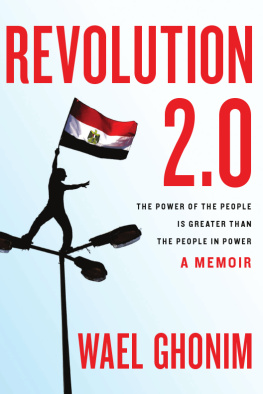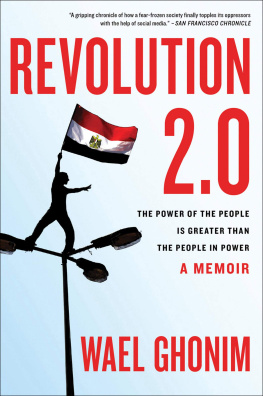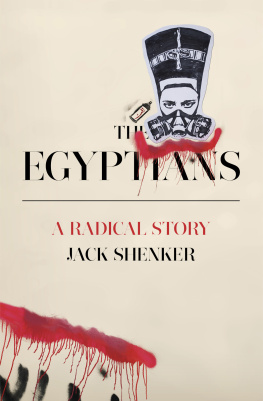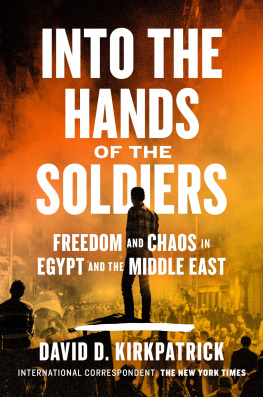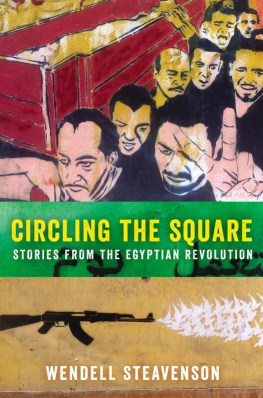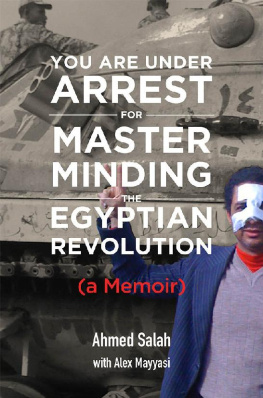Copyright 2012 by Wael Ghonim
All rights reserved
For information about permission to reproduce selections from this book,
write to Permissions, Houghton Mifflin Harcourt Publishing Company,
215 Park Avenue South, New York, New York 10003.
www.hmhbooks.com
Library of Congress Cataloging-in-Publication Data
Ghonim, Wael, date.
Revolution 2.0: the power of the people is greater than the people
in power : a memoir / Wael Ghonim.
p. cm.
Includes index.
ISBN 978-0-547-77398-8
1. Ghonim, Wael, date. 2. Political activistsEgypt.
3. InternetPolitical aspectsEgypt. 4. EgyptHistory1981
I. Title. II. Title: Memoir and call to action.
DT 107.828. G 445 A 3 2012
962.05'5092dc23
[B] 2011042557
Book design by Brian Moore
Endpaper photograph Khaled Desouki / Getty Images
Printed in the United States of America
DOC 10 9 8 7 6 5 4 3 2 1
To all the patriotic Egyptians, Tunisians, and the
rest of the Arabs who took over the streets and
made history that inspired the world
To every brave man and woman who
made the ultimate sacrifice
To future generations, in hopes that they
will live in a free and democratic world
Prologue
T HE WORLD AROUND ME was reduced to pitch black. I could sense the deliberate use of side streets by the driver as the car traveled through Cairo at midnight. We twisted and turned many times, a technique my captors often used to disorient their victims.
On my right and left were two guards from State Security. They kept a tight grip on my handcuffed arms. I remained completely silent so as not to provoke them. They had forced my shirt up to cover my head so I could not see, and my belt was tied firmly over the shirt, around my head. One of them had pushed my head down to hide me from passing pedestrians. Everything I had been carrying had been confiscated.
Those brief moments before the car reached its destination were all too familiar. I had published the accounts of many captives of State Security. Now it was my turn. I wondered what could happen to me next, but I knew the answer: anything.
Get out, you son of a b, said a loud and angry voice when we arrived. I was being pushed out of the car. My reception inside the building was harsh and mocking. I was slapped, kicked, and cursed, all accompanied by derisive laughter. It seemed as if these men enjoyed their work, or at least they did it purposefully. The laughter was part of their strategy to instill fear prior to interrogating newcomers. The most difficult thing about the slaps and kicks was their element of surprise. I had no means of anticipating any strike because I was blindfolded. When would I be hit next? From which side, on which part of me? I had no clue.
I wondered what they knew. What had I done that had given me away? Kick. Curse. My fear grew. I knew that this was what they wantedto break me down before the interrogation. I decided to hasten things along by pretending to tremble. Yet real fear was starting to take over.
In the midst of the beating I prayed to God that he would somehow inspire my friend Najeeb, in Dubai, to change the password to the Facebook pages e-mail account. I prayed for Najeeb to do it before the interrogation got serious. They must not know what I had done.
I wanted to see my children again.
1. A Regime of Fear
M Y 2011 ARREST WAS not the first time I had encountered Egyptian State Security. One winter afternoon in 2007, I received a call from a man who presented himself as Captain Raafat al-Gohary, from the bureau in Giza, Egypts third largest city, which is part of greater Cairo. Needless to say, Rafaat al-Gohary was not his real name. State Security officers feared the potential wrath of citizens they interrogated and tortured, so they used pseudonyms. I greeted him calmly, attempting to hide the anxiety caused by the surprise. He said I needed to meet him for an important matter and I was to head to State Security in Dokki, a neighborhood in Giza, at eleven oclock that night. My anxiety increased. I asked what was the matter. His response: Theres nothing to worry about. Well just have a chat over coffee, thats all. This failed to comfort me. I asked if we could reschedule, saying that I was busy with work. He refused. I wanted to play for time to try to figure out why I was being summoned, but he insisted we meet at eleven. What is the worst that can happen? I wondered. My days of activism were long over. I had never before been summoned.
Immediately after hanging up, I contacted a close friend, and we agreed that I was to call him right after the meeting ended. If he never got the call, he was to find out exactly what had happened to me, since in the past, people in a situation like mine had suddenly disappeared for days or even months after their visit. I decided not to tell my wife or my family anything, as I didnt want them to panic.
I arrived at the main gate at 11 P.M. sharp. The neighborhood was quite familiar to me; my high school was literally right around the corner. At reception, after confirming that I was to meet Captain Rafaat al-Gohary, I was told to sit down and wait. Around me were at least six others. Although I didnt speak to them, it was clear that we all shared one emotion: apprehension.
Egyptian State Security reached deep into society, involving itself in every detail of life. It thrived on the emergency law, enacted in 1958 but not enforced until after the Six-Day War in 1967, and still in effect in mid-2011. That law gives executive authorities the right to arrest, interrogate, and imprison any Egyptian for up to six months without a warrant or any legal grounds or even the right to an attorney. It also empowers the authorities to ban all types of protests as well as gatherings of any group of people without a security clearance.
The dossiers of State Security were objects of fear and ridicule. Any activist of any sort, or even anyone with considerable financial or intellectual influence, had an exhaustive dossier in his or her name at State Security, containing every detail the authorities had collected that could possibly be useful in blackmailing him or her into obedience when needed. Privacy was almost meaningless to this quintessentially Machiavellian organization. Thus, phone tapping, for instance, was a very common practice of State Security officers. Word spread that tapes documenting the infidelities of famous businessmen and public figures were stored in a room at headquarters. Ironically, officers used to advise each other not to spy on their own wives phones, to avoid family conflicts.
Not only did the state monitor and terrorize political opposition groups and religious activists, but its oppressive reach extended to anyone engaged in public service, including charities whose field operations were limited to empowering the poor and unfortunate. With over 40 percent of Egyptians living below the poverty line, the authorities were consistently trying to curb anyone who might mobilize the masses for a future political cause.
State Security approval was obviously a prerequisite for any senior appointment in the government. Even university teaching assistants, who are supposedly selected from among the top students of the years graduating class, could not be hired by the university without a security clearance proving that they were innocent of any dissident activism, political or religious.
The Egyptian regime lived in fear of opposition. It sought to project a faade of democracy, giving the impression that Egypt was advancing toward political rights and civil liberties while it vanquished any dissidents who threatened to mobilize enough support to force real change.
The Ministry of Interior was one key force of coercion. Another was the state media: terrestrial and satellite television as well as newspapers and magazines, the most famous of which were
Next page
